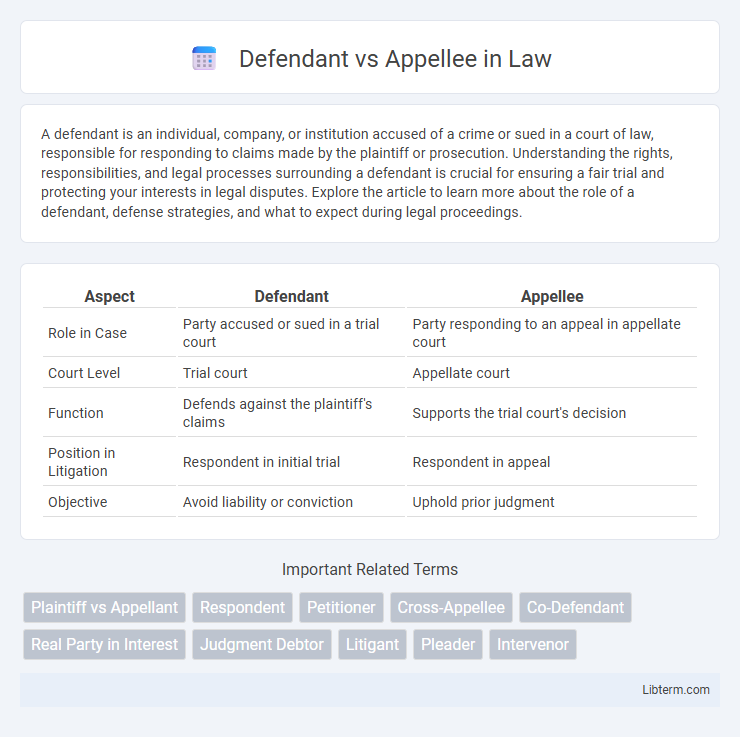A defendant is an individual, company, or institution accused of a crime or sued in a court of law, responsible for responding to claims made by the plaintiff or prosecution. Understanding the rights, responsibilities, and legal processes surrounding a defendant is crucial for ensuring a fair trial and protecting your interests in legal disputes. Explore the article to learn more about the role of a defendant, defense strategies, and what to expect during legal proceedings.
Table of Comparison
| Aspect | Defendant | Appellee |
|---|---|---|
| Role in Case | Party accused or sued in a trial court | Party responding to an appeal in appellate court |
| Court Level | Trial court | Appellate court |
| Function | Defends against the plaintiff's claims | Supports the trial court's decision |
| Position in Litigation | Respondent in initial trial | Respondent in appeal |
| Objective | Avoid liability or conviction | Uphold prior judgment |
Understanding the Terms: Defendant and Appellee
The term "Defendant" refers to the individual or party against whom a lawsuit is filed in a trial court, responding to the plaintiff's claims. The "Appellee" is the party who responds to an appeal, typically the winner in the lower court, defending the trial court's decision. Understanding these roles is crucial for navigating different stages of the legal process, from initial trials to appellate review.
Legal Roles in Civil vs. Criminal Cases
The defendant is the party accused of wrongdoing in both criminal and civil cases, responsible for responding to the plaintiff's or prosecution's claims. In civil cases, the appellee is the party who won in the lower court and opposes the appellant's challenge during the appeal process. While defendants face potential penalties like fines or imprisonment in criminal trials, appellees in civil appeals seek to uphold favorable judgments related to disputes such as contracts or torts.
The Defendant: Definition and Responsibilities
The defendant is the party against whom a lawsuit is filed in a court of law, responsible for responding to allegations and defending their rights. This party may present evidence, cross-examine witnesses, and argue legal points to refute claims made by the plaintiff or appellant. The defendant must adhere to procedural rules and deadlines to avoid default judgment and ensure a fair trial.
Who is the Appellee?
The Appellee is the party who responds to an appeal brought by the Appellant, seeking to uphold the lower court's decision. Unlike the Defendant, who is the party being sued or accused in the initial trial, the Appellee acts in the appellate process to defend the original judgment. The Appellee's role is crucial in appellate courts as they provide arguments supporting the trial court's ruling and oppose the reversal requested by the Appellant.
Key Differences Between Defendant and Appellee
The defendant is the party against whom a lawsuit is initially filed in a trial court, responsible for responding to the plaintiff's claims, whereas the appellee is the party who won at the lower court level and is defending that decision in an appellate court. Defendants appear in the first stage of litigation, dealing with facts and evidence, while appellees participate in appeals, focusing on legal errors and procedural issues. Understanding this distinction clarifies the roles and strategies employed at different stages of the judicial process.
When Does a Defendant Become an Appellee?
A defendant becomes an appellee when the case from the trial court is appealed, and the defendant is responding to the appellant's challenge in the appellate court. This transition occurs after the trial court's decision, where the party who lost at trial (now the appellant) files an appeal, and the opposing party, originally the defendant, defends the lower court's ruling as the appellee. The appellee's role is to support the judgment and convince the appellate court to affirm the trial court's decision.
Court Proceedings: Trial vs. Appeal Stages
The Defendant participates in the trial stage where the case is initially heard and evidence is presented to establish guilt or liability. The Appellee appears in the appeal stage, defending the trial court's decision against challenges raised by the Appellant. Court proceedings in the trial stage involve jury or bench trials, whereas appeal proceedings focus on legal arguments and review of trial records without new evidence.
Rights and Obligations of Defendants and Appellees
Defendants have the right to a fair trial, legal representation, and to present evidence in their defense, while their obligations include responding to charges and complying with court orders. Appellees, as parties responding to an appeal, hold the right to defend the lower court's decision and submit counterarguments or evidence. Both defendants and appellees must adhere to procedural rules and deadlines to protect their legal interests and ensure proper judicial review.
Common Misconceptions in Legal Terminology
Defendant and appellee refer to parties in different stages of legal proceedings, often causing confusion; a defendant is the party responding to a complaint in a trial court, while an appellee is the party opposing an appeal in a higher court. Common misconceptions arise when these terms are used interchangeably, ignoring the procedural context where the appellee may have initially been the defendant or plaintiff. Clarifying these distinctions is essential for accurate legal interpretation and effective communication within appellate processes.
Importance of Correct Legal Identification in Court
Accurate legal identification of parties as Defendant or Appellee is crucial for proper case management and judicial clarity, ensuring each role is understood within the litigation process. Mislabeling can lead to procedural errors, affecting motions, appeals, and the enforcement of judgments. Courts rely on precise terminology to uphold legal standards and maintain the integrity of case records.
Defendant Infographic

 libterm.com
libterm.com